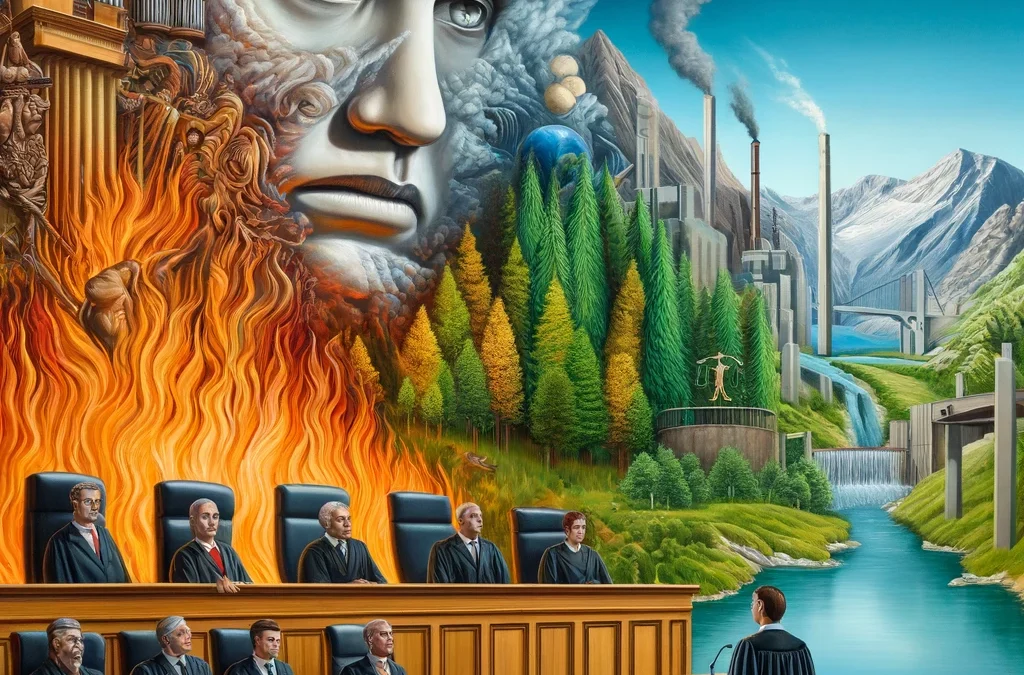Charging Oil Companies with Crimes Against Humanity: A Comprehensive Argument
Introduction
The actions of major oil companies in suppressing climate research and misleading the public about the risks of climate change have had devastating global consequences. These actions have not only delayed meaningful action to combat climate change but have also contributed to widespread and severe harm to people and ecosystems. This argument asserts that these actions should be considered crimes against humanity, warranting legal, economic, and philosophical scrutiny.
Legal Part: Frameworks and Precedents
- Definition and Criteria of Crimes Against Humanity
Crimes against humanity, as defined by the Rome Statute of the International Criminal Court (ICC), include acts such as murder, extermination, enslavement, and other inhumane acts committed as part of a widespread or systematic attack directed against any civilian population. These crimes typically involve deliberate actions that cause significant suffering or death.
- Systematic Deception and Harm
- Systematic Actions: Oil companies like ExxonMobil engaged in systematic suppression of their own climate research while funding misinformation campaigns to cast doubt on the scientific consensus about climate change. These actions were deliberate and coordinated, meeting the criterion of systematic conduct.
- Widespread Harm: The impacts of climate change are global and severe, affecting billions of people through rising sea levels, extreme weather events, food and water insecurity, and health problems. The scale of this harm aligns with the widespread impact characteristic of crimes against humanity.
- Legal Precedents and Challenges
- Historical Accountability: While crimes against humanity have historically been associated with acts of violence, there is a growing recognition that severe environmental destruction can constitute such crimes. Efforts to recognize ecocide as an international crime reflect this evolving understanding.
- Establishing Causation: Proving direct causation between the actions of specific companies and climate impacts can be challenging but is feasible with scientific evidence showing the contribution of fossil fuel emissions to global warming.
- Intent and Knowledge: Internal documents reveal that oil companies were aware of the potential catastrophic impacts of climate change but chose to conceal this information, demonstrating a reckless disregard for human life and environmental well-being.
Economic Part: Costs and Accountability
- Economic Impact of Climate Change
- Direct Costs: The economic costs of climate change include damage to infrastructure, increased healthcare costs, loss of agricultural productivity, and the costs of disaster response and recovery. These costs are borne by governments, communities, and individuals worldwide.
- Indirect Costs: Indirect costs include the long-term economic impacts of displacement, loss of biodiversity, and reduced quality of life. These economic burdens disproportionately affect vulnerable populations, exacerbating inequality.
- Financial Liability of Oil Companies
- Profit vs. Responsibility: Oil companies have profited immensely from the extraction and sale of fossil fuels while externalizing the environmental and social costs. Holding them financially liable for the damages caused by climate change is a matter of economic justice.
- Legal Mechanisms: Lawsuits seeking damages for climate-related costs are a growing trend. Successful cases could establish precedents for holding companies accountable for their contributions to climate change.
- Corporate Accountability: Beyond financial compensation, there is a need for regulatory measures to ensure corporate accountability. This includes mandatory environmental impact disclosures, stricter emissions regulations, and penalties for misinformation.
- Economic Benefits of Accountability
- Prevention of Future Harm: Holding oil companies accountable can deter future deceptive practices and encourage investment in sustainable energy alternatives.
- Economic Transition: Financial penalties and accountability measures can fund the transition to a green economy, supporting renewable energy projects, climate adaptation, and mitigation efforts.
- Restorative Justice: Economic accountability can also support communities disproportionately affected by climate change, providing resources for adaptation and resilience building.
Philosophical Part: Ethical Responsibility and Moral Imperatives
- Ethical Responsibility
- Moral Duty: Corporations, especially those with significant influence over global markets and policies, have an ethical responsibility to act in the public’s best interest. Suppressing critical information about climate risks violates this duty.
- Intergenerational Justice: The impacts of climate change will affect future generations. The actions of oil companies have compromised the ability of future generations to live in a stable and healthy environment, raising issues of intergenerational justice.
- Philosophical Foundations of Crimes Against Humanity
- Human Dignity: Crimes against humanity are fundamentally about the violation of human dignity. The widespread suffering caused by climate change, exacerbated by corporate deception, constitutes a profound violation of human dignity.
- Collective Harm: The philosophical concept of collective harm recognizes that actions affecting large groups of people, especially when those actions are deliberate and harmful, require collective accountability. Oil companies’ actions meet this criterion.
- Reconceptualizing Crimes Against Humanity
- Expanding Definitions: The evolving nature of global challenges necessitates an expansion of legal definitions to include severe environmental harm. Philosophically, recognizing ecocide and similar acts as crimes against humanity aligns with the principles of justice and accountability.
- Moral Imperative for Action: The moral imperative to protect the planet and its inhabitants from severe harm underscores the need for legal and ethical accountability. This includes holding corporations responsible for actions that knowingly endanger the global community.
- Global Solidarity and Ethical Leadership
- Global Solidarity: Addressing climate change requires global solidarity and a collective commitment to ethical principles. Charging oil companies with crimes against humanity reflects a commitment to protecting the common good.
- Ethical Leadership: Leadership in addressing climate change must be rooted in ethical considerations. This includes recognizing the profound moral failures of corporate deception and taking decisive action to rectify these wrongs.
//H.M.W.H
